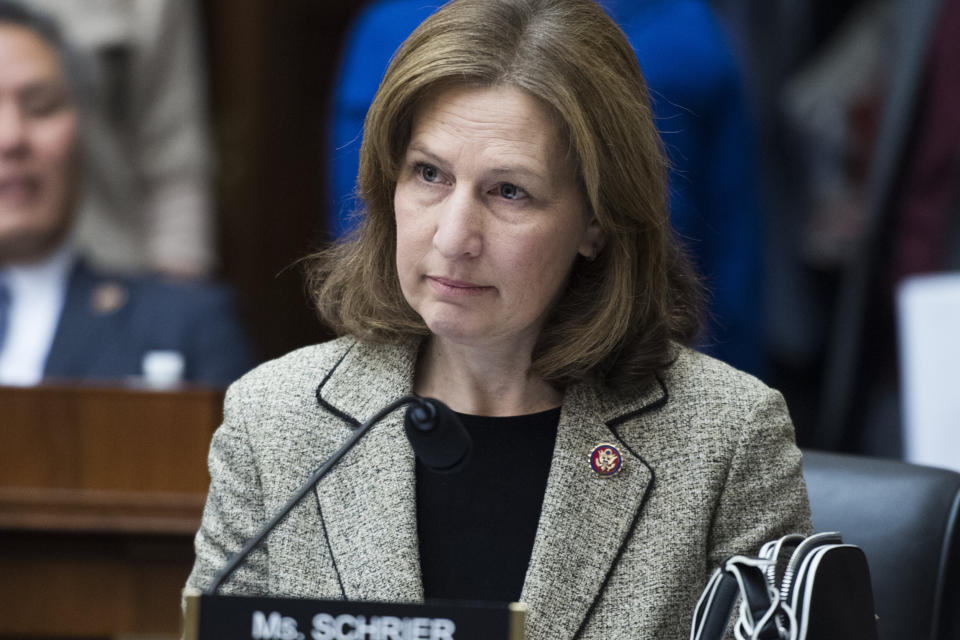Border Patrol seizing children's medication leads to demand for probe
Rep. Kim Schrier, D-Wash., is calling for an investigation into allegations that U.S. Border Patrol agents have been confiscating medications from children and adults taken into custody, a practice described in a Yahoo News report this week.
Schrier, who is also a pediatrician, cited the Yahoo News report in a letter to the acting inspectors general for the Departments of Health and Human Services and Homeland Security on Wednesday. She requested urgent investigations into the medical care of migrant children detained at the border.
“As a doctor and person living with Type 1 diabetes, I am well aware of the deadly consequences of untreated diabetes and was particularly troubled to read of a 15-year-old who arrived in a shelter from custody in diabetic ketoacidosis,” wrote Schrier. The case, which was described to Yahoo News by a physician who treated the teenager, was one of several involving children who reported that their medication for conditions including diabetes and seizures, had been confiscated and neither returned nor replaced.

“Withholding life-saving medications is cruel and creates deadly conditions,” Schrier wrote.
In the letter, Schrier also expressed concern about a report from NBC News this week which revealed the details of a botched effort to reunify families separated under the Trump administration’s zero tolerance policy. The situation resulted in 37 children between the ages of 5 and 12 being left outside a U.S. Immigration and Customs Enforcement detention center in vans for an average of 23 hours last summer.

“It is critical that we have a full understanding of what has happened in these facilities, so we can prevent future incidents,” Schrier wrote, urging the Office of the Inspector General to “immediately investigate the reunification process for children separated from their parents, circumstances surrounding the extended holding of children in vans in July 2018, and the handling of medication for asylum seekers.”
In a phone interview Thursday, Schrier questioned the rationale for confiscating medicine, arguing that concerns about illicit substances could be solved by having drug-sniffing dogs examine any medicines not in labeled bottles.
The “potential dangers” of depriving children with chronic conditions of the medicine they need are “horrifying and totally unnecessary and irresponsible.”
Schrier said she plans to discuss possible next steps with Democratic colleagues in the House, who she said have also expressed concern about the care and treatment of children in custody at the border.
On Twitter, the account of the House Homeland Security Committee, which is led by a majority of Democrats, posted a link to the Yahoo News report beneath the words “Heinous. Infuriating.”
“Confiscating someone's prescribed medications — especially those of vulnerable children — puts them at direct risk of becoming sicker or even dying,” read the tweet.
Heinous. Infuriating.
Confiscating someone's prescribed medications – especially those of vulnerable children – puts them at direct risk of becoming sicker or even dying.
Another symptom of the massive chaos @realDonaldTrump is fomenting at the border. https://t.co/QjgAIz2eqW— House Homeland Security Committee (@HomelandDems) June 6, 2019
According to CBP standards, any detainee who enters Border Patrol custody with medication prescribed outside the United States “should have the medication validated by a medical professional, or should be taken in a timely manner to a medical practitioner to obtain an equivalent U.S. prescription.”
A CBP official with knowledge of the agency’s medical operations insisted that this procedure is being followed for anyone who enters Border Patrol Custody with outside medication, adding that the policy against allowing migrants to “self-medicate” while in custody is for the safety of the detainees themselves.
However, five doctors who volunteer at migrant shelters on the border told Yahoo News that they regularly see adults and children with chronic conditions like diabetes, asthma, seizures and high blood pressure who say their medication was confiscated by border agents upon entering custody and was neither returned nor replaced.
_____
Read more from Yahoo News:
Behind the scenes, candidates vie for Hollywood cash while keeping populist cred
Can Lower Manhattan survive climate change? New York's sea level rise plan faces pushback
How Sen. Mazie Hirono became Trump's toughest Democratic critic
Younger voters continued to outstrip turnout by seniors in 2018




